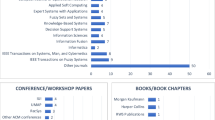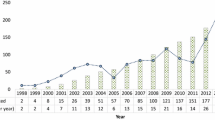Abstract
Multi-agent systems have been attacking the challenges of information retrieval tasks on distributed environment. In this paper, we propose a consensus choice selection method based framework to evaluate the performance of cooperative information retrieval tasks of the multiple agents. Thereby, two well-known measurements, precision and recall, are extended to handle consensual closeness (i.e., local and global consensus) between the sets of retrieved results. We show that in a motivating example the proposed criteria are prone to solve the rigidity problem of classical precision and recall. More importantly, the retrieved results can be ranked with respect to the consensual score, and the ranking mechanism has been verified to be more reasonable.
Similar content being viewed by others
References
Baeza-Yates R, Ribeiro-Neto B (1999) Modern information retrieval. Addison-Wesley, Reading
Borlund P (2003) The IIR evaluation model: a framework for evaluation of interactive information retrieval systems. Inform Res 8(3)
Buckland M, Gey F (1994) The relationship between recall and precision. J Am Soc Inform Sci 45(1): 12–19
Callan JP (2000) Distributed information retrieval, Chap. 5. Advances in Information Retrieval. Kluwer, Dordrecht, pp 127–150
Callan JP et al (1995) Searching distributed collections with inference networks. In: Proceedings of the 18th annual international ACM SIGIR conference on Research and development in information retrieval (SIGIR ’95), New York. ACM Press, New York, pp 21–28
Chen H-H et al (2003) Overview of CLIR task at the third NTCIR workshop. In: Proceedings of the 3rd NTCIR workshop on research in information retrieval, automatic text summarization and question answering (NTCIR-3)
Corrie B, Storey M-AD (2007) Toward understanding the importance of gesture in distributed scientific collaboration. Knowl Inform Syst 13(2): 143–171
Coulouris G et al (1996) Distributed systems—concepts and design. Addison-Wesley, Reading
Crestani F, Wu S (2006) Testing the cluster hypothesis in distributed information retrieval. Inform Process Manage 42(5): 1137–1150
de Kretser O et al (1998) Methodologies for distributed information retrieval. In: Proceedings of the 18th International Conference on Distributed Computing Systems, Amsterdam, pp 66–73
Ellis D (1998) The dilemma of measurement in information retrieval research. J Am Soc Inform Sci 47(1): 23–36
Fu L et al (2005) CQE: a collaborative querying environment. In: Marlino M, Sumner T, III FMS (eds) Proceedings of the 2005 ACM/IEEE Joint Conference on Digital Libraries (JCDL 2005). ACM Press, New York, p 378
Gordon M, Kochen M (1989) Recall-precision trade-off: a derivation. J Am Soc Inform Sci 40(3): 145–151
Gravano L, Garcia-Molina H (1995) Generalizing GlOSS to Vector-Space Databases and Broker Hierarchies. In: Proceedings of the 21th International Conference on Very Large Data Bases (VLDB ’95), San Francisco. Morgan Kaufmann, Menlo Park, pp 78–89
Herrera-Viedma E et al (2004) Incorporating filtering techniques in a fuzzy linguistic multi-agent model for information gathering on the web. Fuzzy Sets Syst 148(1): 61–83
Huhns MN, Singh MP (1997) Agents on the web: agents are everywhere!. IEEE Internet Comput 1(1): 87
Jung JJ (2007) Ontological framework based on contextual mediation for collaborative information retrieval. Inform Retr 10(1): 85–109
Krichel T (2007) Information retrieval performance measures for a current awareness report composition aid. Inform Process Manage 43(4): 1030–1043
Lee RST, Liu JNK (2004) iJADE Web-Miner: an intelligent agent framework for Internet shopping. IEEE Trans Knowl Data Eng 16(4): 461–473
Minkov E et al (2006) NER systems that suit user’s preferences: adjusting the recall-precision trade-off for entity extraction. In: Moore RC, Bilmes JA, Chu-Carroll J, Sanderson M (eds) Proceedings of the Human Language Technology Conference of the North American Chapter of the Association of Computational Linguistics
Nguyen NT (2002) Consensus system for solving conflicts in distributed systems. Inform Sci 147(1–4): 91–122
Nguyen NT et al (2006) A consensus-based multi-agent approach for information retrieval in Internet. In: Alexandrov VN, van Albada GD, Sloot PMA, Dongarra J (eds) Proceedings of the 6th International Conference Computational Science (ICCS 2006). Lecture Notes in Computer Science, vol 3993. Springer, Berlin, pp 208–215
Oates T et al (1997) Cooperative information-gathering: a distributed problem-solving approach. IEE Proc Softw 144(1): 72–88
Palopoli L et al (2005) A graph-based approach for extracting terminological properties from information sources with heterogeneous formats. Knowl Inform Syst 8(4): 462–497
Sakai T (2007) On the reliability of information retrieval metrics based on graded relevance. Inform Process Manage 43(2): 531–548
Sandelin R (2007) Basic of Consensus. http://www.ic.org/nica/Process/Consensusbasics.htm
Simeoni F et al (2007a) A grid-based infrastructure for distributed retrieval. In: Kovács L, Fuhr N, Meghini C (eds) Proceedings of the 11th European Conference on Digital Libraries (ECDL 2007), Budapest, Hungary, September 16–21. Lecture Notes in Computer Science, vol 4675. Springer, Berlin, pp 161–173
Simeoni F et al (2007b) The DILIGENT framework for distributed information retrieval. In: Kraaij W, de Vries AP, Clarke CLA, Fuhr N, Kando N (eds) Proceedings of the 30th Annual International ACM SIGIR Conference on Research and Development in Information Retrieval (SIGIR 2007), Amsterdam, July 23–27, pp 781–782
Voorhees EM et al (1994) The collection fusion problem. In: TREC
Wu S, Crestani F (2003) Distributed information retrieval: a multi-objective resource selection approach. Int J Uncertain Fuzziness Knowl Based Syst 11(1): 83–99
Zudilova-Seinstra EV (2007) On the role of individual human abilities in the design of adaptive user interfaces for scientific problem solving environments. Knowl Inform Syst 13(2): 243–270
Author information
Authors and Affiliations
Corresponding author
Rights and permissions
About this article
Cite this article
Jung, J.J. Consensus-based evaluation framework for distributed information retrieval systems. Knowl Inf Syst 18, 199–211 (2009). https://doi.org/10.1007/s10115-008-0153-3
Received:
Revised:
Accepted:
Published:
Issue Date:
DOI: https://doi.org/10.1007/s10115-008-0153-3




